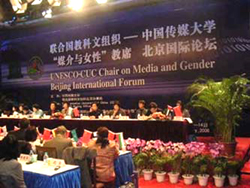
At the Communication University of China on Thursday, Chinese
and international experts convene to discuss the mutual influence
between the media and women's social development.
The three-day forum is part of the University's UNESCO Chair
Program on media and gender. CRIENGLISH.com reported.
"The newly-established UNESCO chair of the Communication
University of China has invited other UNESCO chair holders to
Beijing to share their experience and results of their
research."
This is Director of Beijing's UNESCO Office, Yasuyuki Aoshima,
addressing the first international forum on media and gender
equality, which opened on Thursday.
It is the first international forum since the establishment of
UNESCO's chair on media and gender at the Communication University
last September.
As society's messenger, the media is a very powerful force in
pushing gender equality and social development forward. On one
hand, listening to radio, and watching TV and film have become an
integral part of the Chinese people's cultural lifestyle.
As Deputy Director of the State Administration of Radio, Film
and Television, Zhao Shi reports that Chinese women today are
becoming more concerned with state affairs.
A recent survey shows 55.4 percent of Chinese women prefer to
listen to or watch news to entertainment programs. The figure
demonstrates a 21st century trend. Women have now developed a
stronger interest in social issues and connect their own destinies
closely with that of their country and changes in the world. They
also associate personal career development with national
development and social progress.
As the media works to empower women with knowledge, the number
of women actively participating in the field of journalism has
risen. Official statistics show by the end of 2005 women's
participation constitutes nearly 40 percent of the over 120,000
licensed editors and reporters in China. Nearly 70 percent of the
16,000 broadcasters and anchors are women.
In addition to the round-table discussions, women experts and
media representatives from 10 Chinese western provinces will
deliver speeches. International women experts will also field
questions from the audience.
(CRI.com January 13, 2006)

